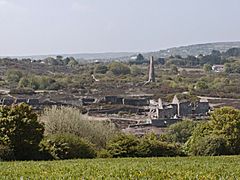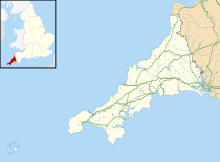Poldice mine facts for kids

The ruins of Poldice mine
|
|
| Location | |
|---|---|
| Location | St Day |
| County | Cornwall |
| Country | England |
| Coordinates | 50°14′10″N 5°10′23″W / 50.236°N 5.173°W |
| Production | |
| Products | Tin, Copper, Arsenic and others |
| History | |
| Opened | 17th century or earlier |
| Closed | 1930 |
Poldice mine was once a very busy mine in Cornwall, England. It's located in the Poldice Valley, close to small villages like Todpool, Twelveheads, and St Day. This mine used to dig up different kinds of metals from the ground.
Contents
History of Poldice Mine
People think mining started at Poldice around the early 1500s. We know for sure it was working by the 1600s.
The Great County Adit
In 1748, two important people from Poldice, William Lemon and John Williams, began building something called the Great County Adit. An adit is like a long tunnel dug into the side of a hill. This special adit helped drain water out of many mines in the area. It also helped miners find new places where valuable metal ores were hidden.
When the adit reached Poldice in the late 1760s, the mine was using two large Newcomen steam engines. These engines were very powerful. They helped pump water out of the mine and into the adit.
Early Transport and Engines
Getting the mined materials to market was a challenge because the mine was far from the sea. To solve this, a new type of railway was built. The Portreath Tramroad opened in 1812. This pioneering railway made it much easier to transport goods to Portreath harbour.
In 1821, Poldice mine got a huge new pumping engine. It was a 90-inch Woolf engine. This was one of the biggest steam engines in Cornwall at the time. It could pump out a lot of water, about 887 gallons every minute! This engine worked very hard for many years. It was later sold in 1867.
Changes and Closure
By the 1860s, the demand for copper started to go down. Because of this, Poldice mine began selling off some of its old equipment. Even so, the mine bought a new 85-inch pumping engine in 1873. This new engine was needed because a very wet winter caused a lot of flooding in the mine.
However, the mine couldn't afford the high cost of pumping out all the water. So, after only six months, the new engine was put up for sale. Poldice mine closed down in July 1873. The engine was then sold to a company in Scotland.
Minerals Found at Poldice
Poldice mine first dug for tin ore in 1748. But by 1788, it was producing more copper ore than tin. In the early 1800s, Poldice mine joined with a nearby mine called Wheal Unity.
Later, the mine started focusing on digging for arsenic. Even though they still mined some metals, the amount decreased over time. By the 1910s, most of the mining activity had stopped. Small-scale mining continued for a few more years, but the mine finally closed completely in 1930.
Besides the large amounts of tin, copper, and arsenic, Poldice was also known for some rarer and more special minerals. These included chalcophyllite, olivenite, mimetite, and liroconite.
Poldice Mine Today
Today, you can still see the ruins of many old mine buildings and shafts in the Poldice Valley. The area hasn't been built on since the mining stopped. Now, the valley is a peaceful nature reserve, a great place to explore the history of mining in Cornwall.
 | Dorothy Vaughan |
 | Charles Henry Turner |
 | Hildrus Poindexter |
 | Henry Cecil McBay |


